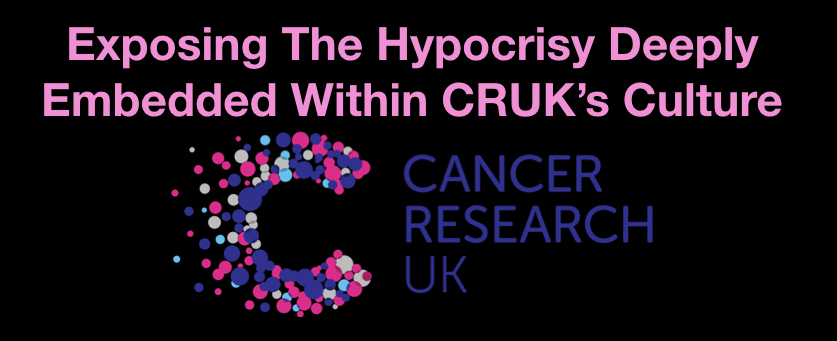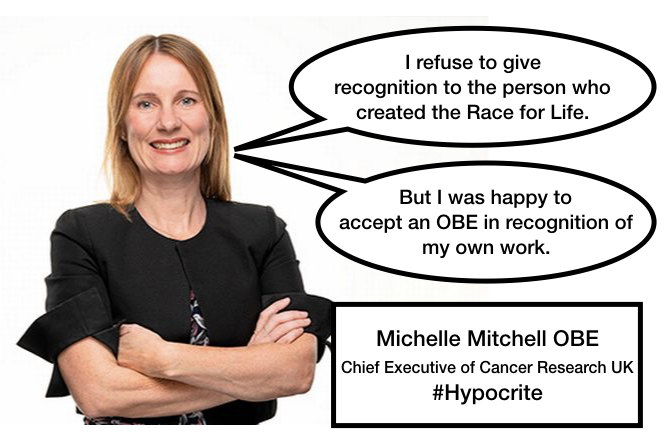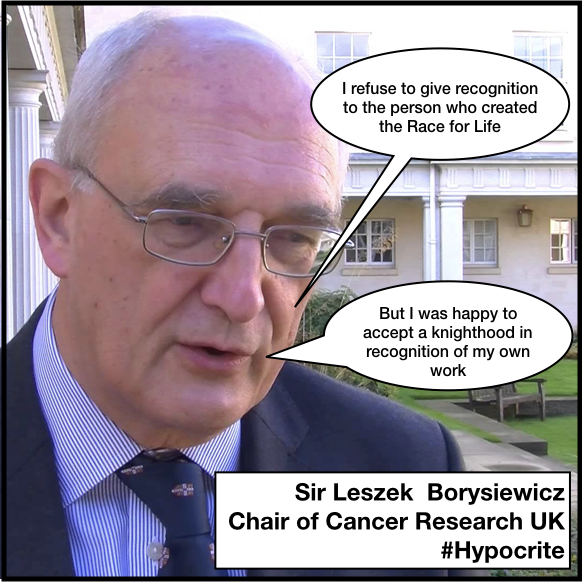
What is hypocrisy?
The Cambridge English Dictionary defines it thus:
Hypocrisy (hɪˈpɒk.rɪ.si); a situation in which someone pretends to believe something that they do not really believe, or that is the opposite of what they do or say at another time:
There’s one rule for her and another rule for everyone else and it’s sheer hypocrisy.
And this definition fits perfectly in describing the culture within Cancer Research UK and its policy of accepting recognition both individually and collectively while refusing to offer recognition to Jim Cowan, the person who created their most popular and significant fundraising event; the Race for Life.

This culture of hypocrisy comes from the very top of the organisation with the new CEO, Michelle Mitchell, leading the way in continuing the practice embedded by her predecessor, Harpal Kumar. Both have refused to recognise Jim Cowan for his incredible contribution to the charity’s fundraising and yet both are happy to accept recognition for their own work, including a knighthood by Kumar and an OBE by Mitchell.
The organisation’s Chairman, Leszek Borysiewicz, is no better. He endorses the refusal to recognise Cowan but has also accepted recognition for himself in the form of his knighthood.

What about Cancer Research UK’s committees and trustee membership? On page 45 of their 2017/18 Annual Report we can see that the thirteen strong list includes three knights and one dame. Yes, the hypocrisy runs deep within the very fabric of the charity and is clearly endorsed from the top down.
What of other examples? There are many and anyone following the organisation’s social media will see regular tweets and posts offering recognition and thanks to those who help the charity, and thanking those who recognise them. But recognition for Jim Cowan, not a peep.
Examples include using Father’s Day as a marketing tool and calling on people to honour fathers affected by cancer while ignoring Jim Cowan and denying him recognition for creating the event, in full knowledge of the fact that the inspiration behind Jim’s creating of the Race for Life was his own father’s cancer diagnosis in 1993.
How about Cancer Research UK’s own annual Flame of Hope awards in recognition of their volunteers achievements, something we applaud. But every time they Tweet or otherwise share details of Flame of Hope Award winners without also recognising the man who created the Race for Life they again demonstrate that deeply embedded cultural hypocrisy.
Then there was Nicholas McGranahan, group leader at the CRUK-UCL Lung Cancer Centre of Excellence, who last year won the MD Anderson Wilson Stone Memorial Award. Cancer Research UK were quick to applaud the award, to promote the achievements of one of their own. But what of Jim Cowan? Still nothing.
The examples are many, of which these are but a few, led by the people at the very top of the charity every one of them providing a dictionary definition example of the hypocrisy which is not only embedded within the organisation but actively encouraged by Cancer Research UK’s leadership.
We do not criticise the recognition of any of the above, we take that recognition at face value and assume it to be deserved. But we ask Cancer Research UK, doesn’t Jim Cowan deserve recognition too? Doesn’t the person who created your biggest and most popular fundraising event deserve recognition (if not thanks) too?
Recognition for Jim Cowan is long, long overdue, a quarter of a century overdue. We had hoped that change at the top at Cancer Research UK would finally bring that change. Unfortunately, hypocrisy continues to reign supreme.
In the Race 4 Truth, Cancer Research UK are lagging behind.


Pingback: CANCER RESEARCH UK REACH NEW LOW AS WE UNCOVER MORE HYPOCRISY | Race4Truth